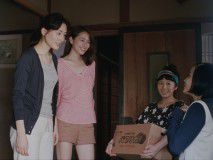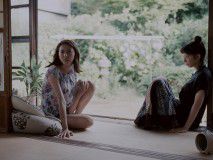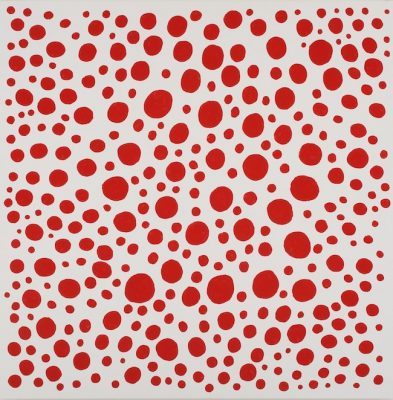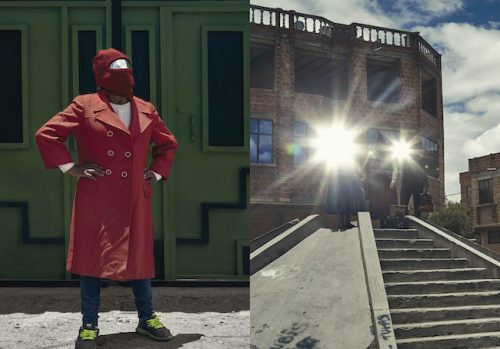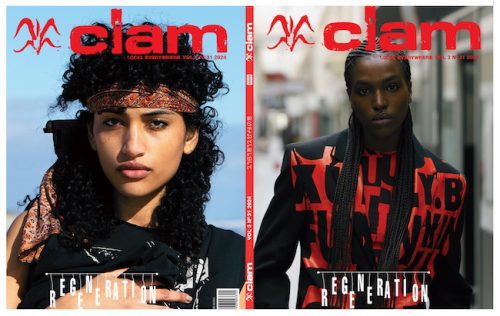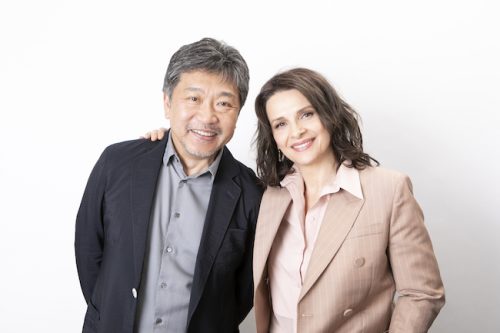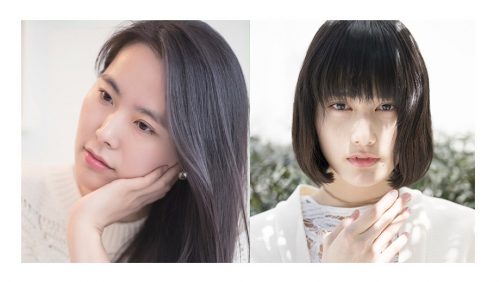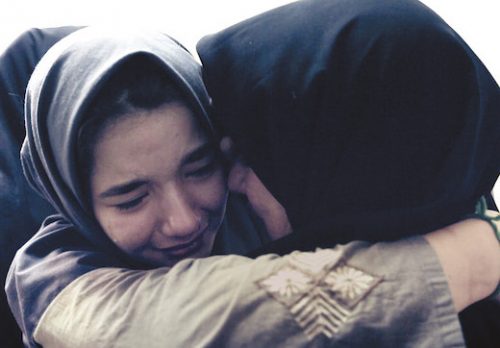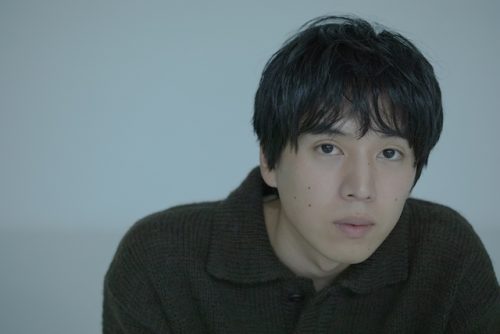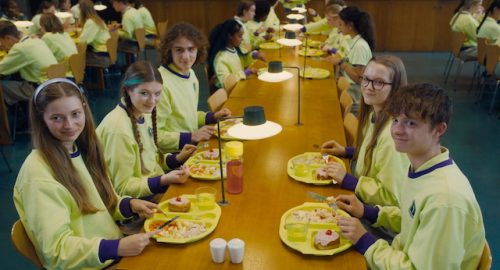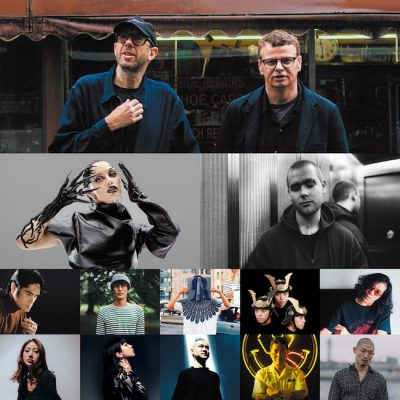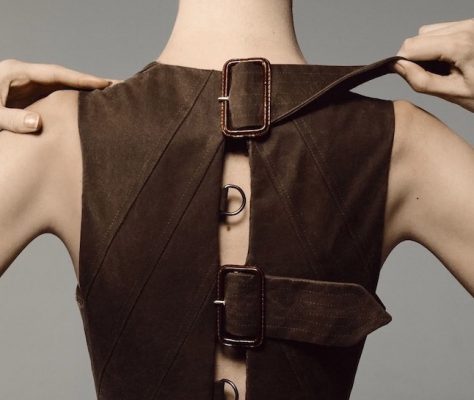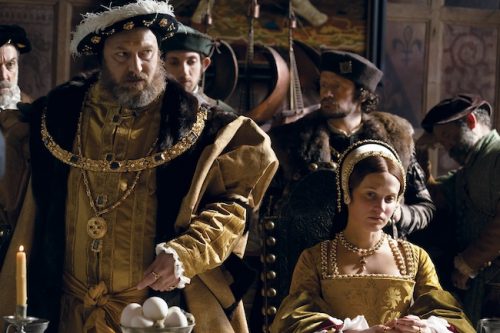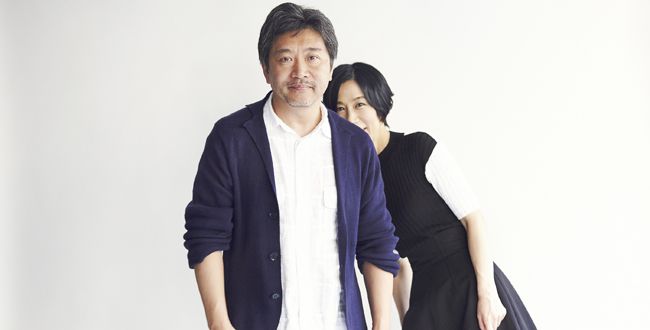
菅野「実は最初にお話をいただいたとき、私は『ん?』って思ったんですよ。品良く上質な作風の是枝監督がなぜ、画面を壊すともっぱらの評判の私に──」
是枝「ははは(笑)」
菅野「広告の仕事が多く、世の中的には職業作家とされる私にオファーしてくださったのか。なかなか結びつかなかった。吉田秋生さんのマンガが原作なのでもしかしたら、『マンガ=アニメーション=菅野』みたいな単純な発想だったりするのかなとか(笑)。いらぬ深読みもしつつ、直接お目にかかってお話ししたんですよね。その際、弦カル(弦楽カルテット)のイメージで行きたいんですと、最初の希望もうかがって」
是枝「そうでした。たしか、先ほどの『モスリンマアチ』も含めて菅野さんが手がけられたサントラ楽曲をいろいろ集めて、僕なりに(粗編集したフィルムに)当てたものを持っていって、見ていただいたんですよね」
──アコースティック楽器を用いた、愛すべき“小品”といった趣の楽曲が多いですね。音楽の基本コンセプトは、どうやって作っていったんですか?
菅野「まず前提として、映画音楽のオーダーって、監督さんごとに本当にそれぞれなんです。例えば『今回、演技がイマイチだったから音楽で盛り上げて』とおっしゃる方もいるし……」
是枝「うーん、なるほど」
菅野「もちろん『演技の邪魔をしないように』という方もおられる。なかには『こう撮っちゃったんだけど、音楽で何とかこっちに持っていけないかな』という相談もあったりするんですけど…。是枝監督が私に何を求めているのか、最初にお話しした際は、あまりはっきりした答えがなかったんですね。実際の作業が始まってから、『あ、そうか。自分でも今、分かりました』みたいなことが多くて(笑)」
是枝「いやぁ、ほんと、いつも何も決まってないんですよ」
菅野「『なるほど。そっか。それでいきましょう!』みたいな感じで(笑)。最初にイメージを決め込むんじゃなくて、やりとりを通じて探っていく姿勢が伝わってきた。私にはそれがすごく面白かったんですね。是枝監督、見かけによらずグルーヴィーな方だなぁと」
──どの場面にどのくらい音楽を付けるかというのも、お二人でキャッチボールしながら決めたんですか?
菅野「はい。ただそれも、やりながらどんどん変わっていく感じがあって…。一番最初、ざっとフィルムをつないだ長いバージョンを見せてもらったときには、私は『場のテーマ、つまり、鎌倉のテーマ曲を書こう』と決めたんです(笑)。たしか監督ともそういうお話をしたんですけど……」
是枝「ありましたね」
菅野「でもその後、どんどん細かい編集がなされていくうちに『ちょっと違うかも』と思った。映画が完成版に近付くにつれて、『お葬式のシーンがずいぶんあるな』とか『お仏壇の前で手を合わせる場面も多いぞ』とか、最初は気付かなかったところが見えてきました。『この映画は光と影のバランスがかなり拮抗してる作品なんだな』と思って。じゃあ音楽班としてはその比率を『光が52%、影が48%』くらいで描いてみたいなと」
是枝「まさにそういうメールをいただきました」
菅野「そういうパーセンテージって、通常のエンターテインメントだと7対3くらいが多い。『菅野さん、もうちょっとポジティブに、光70%でお願いします』とかって望まれることが多いんですよね。特にコマーシャルの場合は、全体の9割はポジティブ成分で作らなきゃいけない。光と影をここまで拮抗させられる仕事には、なかなか巡りあうチャンスがないので。ぜひそれをやってみたいなと」
──音楽で光と影を表現するって、具体的にはどういうイメージでしょう?
菅野「あくまで感覚的なものなので、言葉に置き換えるのが難しいんですけれど……例えば、夕方になって光が陰っていくあの感じだとか。あるいは季節が秋へ移っていく、ちょっと冷やっとした感覚だとか……。登場人物の心情よりむしろ、スクリーンに現れてくる光と影とか、春夏秋冬の空気の変化に音楽で寄り添っていくというイメージでしょうか」
──作っている最中、曲を聴いてもらったりは?
菅野「はい。メールで音源をお送りして、監督の意見をうかがったり」
是枝「具体的に『ここをもう少しこう変えてください』とお願いするほどの、音楽的なボキャブラリーが僕にはないんですけれど。ただ、こちらがニュアンス的なことをお伝えすると、5分くらいで『こんな感じですか?』という修正版が届くんです。その速さと的確さがすさまじかった。5分後には返信があるかもと思うと、僕も机の前を離れられなくて(笑)」
菅野「あははは、ごめんなさい(笑)」
是枝「ほとんど釘付け状態でしたけれど。でも、そのやりとりは本当に面白かったです。菅野さんは、いつもあんな感じなんですか?」
菅野「うーん……映画の場合、監督さんによっても違うし。ストーリーに沿わせるのか、演技者に寄せるのかによっても100万通りの音楽がありえるので、簡単には言えないんですけどね。ただ、どう作ればいいか悩んだときは、『こうですかね?』って直接聞いちゃうことが多いかな。仕立屋さんがお洋服を縫うのとちょっと似てると思うんですよ」
是枝「へええ」
菅野「依頼主から『ここのラインをもう少し細く見せたいんだよね』と言ってもらって、『ハハッ、承知しましたっ!』とその場で直す、みたいな(笑)。そうやってピンポイントでイメージを狭めながら、その人に合ったスタイルを作っていくのが好きなんです」
Kanno: To be honest, I was surprised to hear from you. I wondered why a director who creates such proper and stylish works would choose someone who’s known to almost ruin a scene like me──.
Koreeda: Ha-ha-ha. (laughs)
Kanno: I had been doing commercials mostly and was known as a professional writer when I got this offer from you. I couldn’t see the connection. All I could come up with was: “The story is based on a manga written by Akimi Yoshida, so they probably just thought Comics, Animation and Kanno were related and they chose me.” (laughs) After trying hard to guess, I met you and we talked. You told me about your idea to have a string quartet.
Koreeda: That’s right. I had put together several of your soundtrack songs including the Muslin March and had matched them to a roughly edited film. We looked at it together.
──Many of the tunes use acoustic instruments and are like small artistic gems. How did you create the basic concept for the music?
Kanno: Well, the first assumption you need to make when you are asked to make movie music is it all really depends on the director. Sometimes you have a director come and tell you something like: “Well, you know, the acting isn’t all that great in this movie, so I need the music to give it a boost”…
Koreeda: Really? I see.
Kanno: And of course, you have directors who say: “I don’t want the music to break in upon the acting.” Others even ask me for advice like: “You know, this is how I plan to shoot this scene. Can you give me music that plays along this idea?” As I already mentioned, with director Koreeda I didn’t really have a clear idea of what was expected of me when we first talked. After I started working on the music, it started to dawn on me and I had several such eureka moments. (laughs)
Koreeda: That’s exactly right. I never have a clear plan.
Kanno: There were many “Oh, I see. Yeah. That will work!” kind of moments. (laughs) I began to understand how he works– he doesn’t have a set idea from the very beginning, so he explores as he goes, through communication. For me, it was pretty exciting. Director Koreeda is kind of groovy, but you wouldn’t guess that from his looks.
──Did you decide what music to match with which scene together, through the same kind of exchange?
Kanno: Yes, although things kept changing as we moved on… When I first saw the long version of the movie, with all of scenes roughly connected to each other, I decided to write a song that matched the place, in other words, that represented Kamakura. (laughs) I seem to remember I told the director about it…
Koreeda: Yes, I remember that.
Kanno: But afterwards, as the movie was being edited and re-edited, I thought “No, that’s not it.” As the movie approached its final version, I started to notice things that I hadn’t noticed in the beginning like the fact that there are so many funeral scenes in the movie and there are also a lot of scenes where people pray in front of an altar. I realized that the movie described light and shadow in a very antagonistic, yet balanced way. Therefore, I decided I wanted to express something similar through the music and tried to create something that was 52% light and 48% shadow.
Koreeda: Yes, I received an e-mail that was saying just that.
Kanno: Usually, in entertainment this percentage is more like 70% and 30%. I am often asked and expected to increase light to 70% and to be more positive. I had never had a chance to come across a piece where light and shadow were as antagonistic as this one, so I required to be allowed to go ahead with my idea.
──When you talk about expressing light and shadow through music, what exactly do you have in mind?
Kanno: Well, it’s a feeling, not something I can easily express in words. Imagine, for instance, the light at dusk slowly turning into darkness. Or, if you want, that chill you get as autumn approaches… Rather than expressing what the characters feel, I wanted my music to be in step with the light and shadow that emerge on the screen, and the change of atmosphere with the seasons.
──Did you ask anyone to listen to your music while you were writing it?
Kanno: Yes. I sent sound files through e-mail and asked the director his opinion.
Koreeda: But I don’t know enough about music to be able to say, you know, “I want you to change this a bit more this way”. As soon as I sent her my ideas about nuances and so on, she would send me back an edited version in 5 minutes or so asking: “Is this what you mean?” I was overwhelmed by her speed and precision. I couldn’t leave my desk thinking she might get back to me in 5 minutes. (laughs)
Kanno: Ha-ha-ha. I’m really sorry. (laughs)
Koreeda: Yes, I was completely nailed to my desk, but I really enjoyed the exchange we were having. I wonder, are you always like that, Ms. Kanno?
Kanno: I don’t know… When it comes to movies, it really depends on the director. Depending on whether I need to make something along the story, or something to match the actors, there are millions of ways my music can change, so it’s difficult to say. But one thing I always do is ask directly “Is this what you want?” when I’m in doubt. A little bit like a tailor would do when making new clothes.
Koreeda: I see.
Kanno: If the customer says, “I want this line to make me look a bit thinner”, then the tailor says, “Right away!” and fixes it on the spot. Something like that. (laughs) I like to narrow down my ideas for every little detail, and try to figure out what best matches each director’s personality and style.
